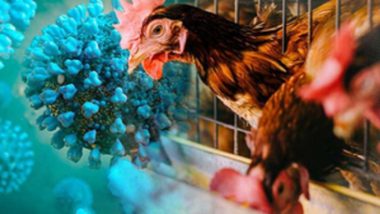Washington, DC, May 23: A second person in the United States has been infected with bird flu, ABC News reported, citing health officials. The Michigan Department of Health and Human Services (MDHHS) said that a Michigan farmworker who had regular exposure to livestock-infected bird flu, or avian influenza, has been infected with bird flu.
The Centers for Disease Control and Prevention (CDC) said the Michigan dairy worker was being monitored due to their work exposure to H5N1-infected cattle and reported symptoms to local health officials. Bird Flu in US: Three More Dairy Farms Report Cases of H5N1.
In the press release, the CDC said, "Two specimens were collected from the patient. An upper respiratory tract specimen collected from the worker's nose was negative for influenza virus at the state health department laboratory. The eye specimen was sent to CDC for testing because it is one of a few labs where those specimens can be used with the CDC A(H5) test. The specimen was received by CDC and testing results confirmed A(H5) virus infection."
"The nasal specimen was retested at CDC and confirmed to be negative for influenza. The state was then notified of the results. The designation of the influenza virus neuraminidase (the N in the subtype) is pending genetic sequencing at CDC. Attempts to sequence the virus in the clinical specimen are underway and will be made available within 1-2 days if successful." it added. Bird Flu in US: Cats Suffer Blindness, Death After Catching H5N1 Virus by Drinking Cow Milk in Texas.
The MDHHS said the farm worker has since recovered, and it will not reveal any additional identifying information regarding the farmworker. Earlier in April, the first human case of bird flu was identified in Texas, and it was also associated with cattle, according to ABC News reported.
The infected person worked directly with sick cattle and reported eye redness as their only symptom. Only three cases of bird flu, including in Michigan, have ever been reported across the US. According to MDHHS and the CDC, the risk to people remains low. Dr Natasha Bagdasarian, chief medical executive at MDHHS, in a statement said, "Michigan has led a swift public health response, and we have been tracking this situation closely since influenza A (H5N1) was detected in poultry and dairy herds in Michigan."
Bagdasarian added, "Farmworkers who have been exposed to impacted animals have been asked to report even mild symptoms, and testing for the virus has been made available," according to ABC News report. According to the statement, the current health risk to people is low. The statement further reads, This virus is being closely monitored, and we have not seen signs of sustained human-to-human transmission at this point. This is exactly how public health is meant to work, in early detection and monitoring of new and emerging illnesses."
MDHHS said it is working with the Michigan Department of Agriculture and Rural Development (MDARD) to monitor the health of people exposed to infected animals and monitor affected poultry. Earlier in March, the US Department of Agriculture said that a bird flu strain that had made millions of birds sick across the US was identified in several mammals this year. At the time, three states in the US had reported cases of bird flu in mammals in 2024, including striped skunks found in Washington state, a mountain lion in Montana and a raccoon in Kentucky.
A few weeks later, federal and state public health officials said they were carrying out investigation into an illness among primarily older dairy cows in Kansas, New Mexico and Texas and causing symptoms including decreased lactation and low appetite.
At the time, the USDA in a statement, said that "there is no concern about the safety of the commercial milk supply or that this circumstance poses a risk to consumer health." Several dairy cows have been infected, leading to milk samples showing inactive remnants of the virus. However, the health officials have said that the milk supply is safe.
Meanwhile, MDHHS announced it advises people working on poultry or dairy farms to get seasonal flu vaccination. The press release, said, "It will not prevent infection with avian influenza viruses, but it can reduce the risk of coinfection with avian and flu viruses," ABC News reported.
CDC Principal Deputy Director Nirav D Shah said avian influenza surveillance systems in the US must continue functioning at increased levels during the summer and to raise the number of samples positive for influenza A virus submitted to make sure even rare case can be detected. Shah made the remarks in a meeting with public health partners on Tuesday.
(This is an unedited and auto-generated story from Syndicated News feed, LatestLY Staff may not have modified or edited the content body)













 Quickly
Quickly




















